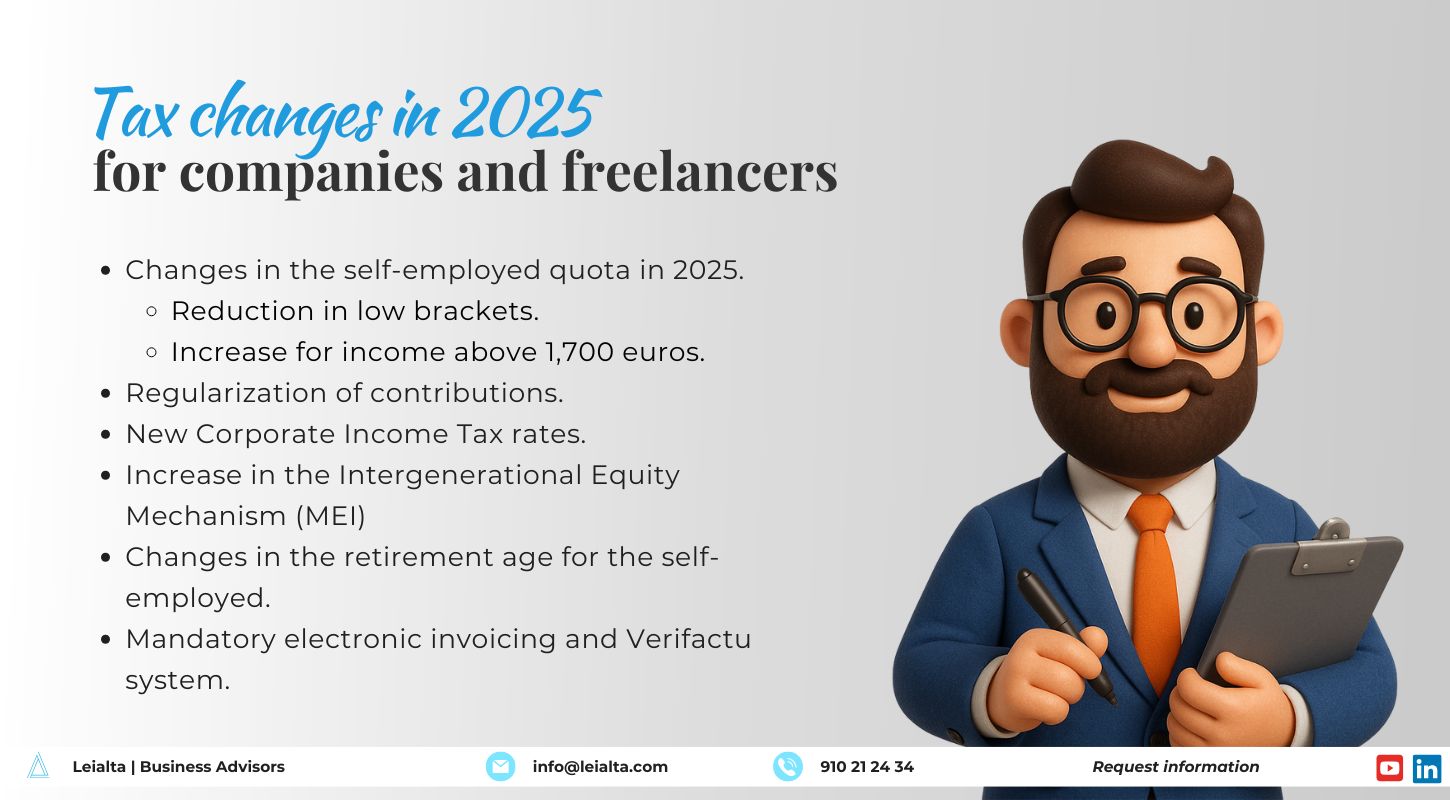
The year 2025 has started with a series of regulatory changes that should be on the radar, especially for those who develop their economic activity as freelancers or manage a company. Some of these measures come into force this year; others were already foreseen in previous years and are starting to be applied effectively. In addition, there are reforms still in the legislative development phase which, if approved, could substantially modify the current tax framework.
That is why, below, we offer you a summary of the main changes that have already been confirmed and those that should be closely followed throughout the year.
Tax Changes in Spain: Self-Employed Contribution Brackets in 2025
Index of contents
As of January, the contribution system for the self-employed has brought very significant changes:
- Reduction in low brackets: the self-employed with an income of less than 1,700 euros will have lower monthly quotas, with an annual reduction of between 80 and 428 euros, depending on the bracket.
- Increase for income above 1,700 euros: these will see an annual increase of between 272 and 970 euros, depending on the bracket.
Regularization of contributions in 2025
In addition, during the first four months of the year, the regularization of contributions corresponding to 2023 has been carried out, comparing the amount paid with the actual income declared:
- January-February: automatic refund in cases where contributions have been paid in excess of what was due.
- March-April: notification of the amount to be paid and deadline to pay the difference, in the event of underpayments.
This regularization will be repeated in successive years, so it is important to adjust the brackets correctly from the beginning of the fiscal year.
New Corporate Tax rates (Impuesto sobre Sociedades – IS)
In turn, as from fiscal year 2025, whose liquidation will be presented in 2026, reduced Corporate Income Tax (IS) rates will be applied for micro-companies and SMEs, according to Law 7/2024:
- For micro-companies with a turnover of less than 1 million euros: They will have a reduced rate of 21% for the first 50,000 euros of taxable base. In addition to 22 % for the rest of the base.
- For small and medium-sized companies with a turnover between 1 and 10 million euros: They will have a reduced rate of 24% instead of the usual 25%.
These measures seek to alleviate the tax burden on small businesses and facilitate their growth.
Increase in the Intergenerational Equity Mechanism (MEI), a Spanish public pension contribution
The MEI, applied since 2023 with the aim of strengthening the income of the public pension system, will rise again in 2025.
In other words, it would increase from 0.7% to 0.8% of the contribution base, both for employees and the self-employed.
This percentage is applied to social contributions and has a direct impact on companies’ labor costs.
Changes in the retirement age for the self-employed
From the beginning of the year, i.e. from January 1, 2025, the ordinary retirement age with 100% of the pension will be 65 years, provided that they have been able to contribute at least 38 years and 3 months. This represents an increase of three months compared to 2024.
However, one of the most important new features is that, if this minimum contribution period is not reached, the legal age is postponed to 66 years and 9 months. This is a change that especially affects long-term self-employed workers and forces them to review their retirement planning.
On the other hand, the option of early retirement is always left open for anyone who wishes to retire before that date. For this to be possible, a reduction in the percentage of the pension to be received would have to be made.
Mandatory electronic invoicing and Verifactu system
Although Verifactu was initially expected to become mandatory in 2026, the Spanish Government has now postponed its entry into force until 2027.
The digitalisation of administrative processes continues to advance, and Order HAC/1177/2024 sets out the technical requirements that Invoicing Information Systems (SIF) and the Verifactu model must meet. This framework defines how invoicing software will generate secure, traceable and verifiable records and, where applicable, interact with the Tax Agency (AEAT).
The aim of this regulatory change is to strengthen transparency and improve communication with the AEAT through invoicing systems that ensure integrity and traceability.
What requirements does Verifactu introduce?
- Generation of digital fingerprints (hash) and, where applicable, electronic signature to guarantee invoice integrity.
- Authentication through an electronic certificate.
- A responsible declaration issued by the invoicing software provider confirming compliance with the SIF requirements.
Although the system was originally planned to take effect from 2025, the Government has extended the implementation deadlines, and Veri*Factu will not become mandatory until 2027.
It is still advisable to begin the technological adaptation as early as possible to avoid operational risks and disruptions, and to rely on expert guidance throughout the transition.
For this reason, at LEIALTA we have a specialized and multidisciplinary team, fully prepared to help you interpret and correctly apply all the changes that will affect your business in 2025. From the adaptation to the new contribution system to tax planning or the implementation of electronic invoicing. We accompany you with a practical, rigorous and personalized approach.
LEIALTA is one of the few consultancies that combines technical advice with a strategic vision of the business. Our team is ready to help you meet your obligations without losing sight of the profitability and efficiency of your company.



